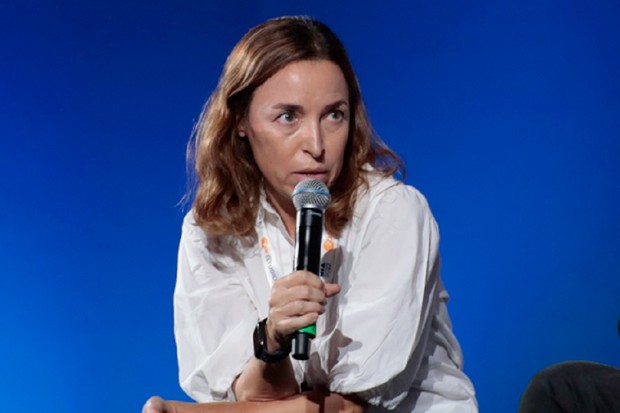Monica Ciarli • Sales Agent, Minerva Pictures
“More and more often, sales agents are having to invest a little in production or even produce their own films”
- We sat down with the Roman firm’s head of international sales to discuss a variety of topics, including how the role of the sales agent is evolving and taking a new direction

Cineuropa seized the opportunity to interview Monica Ciarli, head of international sales at the Roman production, distribution, sales and multimedia publishing firm Minerva Pictures. The conversation encompassed a variety of topics, notably the company’s editorial policy, catalogue and its production and sales work.
Cineuropa: What is Minerva Pictures’ focus and how are tasks divided within the foreign sales team?
Monica Ciarli: I’ll give you a little overview. I joined Minerva six or so years ago. Since then, we’ve revived the foreign sales department and at this point in time I’m overseeing it; we also have a consultant who takes care of sales in Italy and abroad, and a team of very capable, young girls – one specialising in acquisitions for overseas, one in our library and another in festivals. That’s how we’re set up right now. Minerva is a long-standing firm, it’s been involved in production, distribution and international sales for years, and this year it will be 70 years old.
How big is your catalogue and what is your speciality in sales terms?
We have an enormous library roughly holding 3,000 titles in all. But internationally, we manage somewhere in the region of 700-800. Among these are “big boys” like The Conformist, Conversation Piece, The Seduction of Mimì, Il generale Della Rovere, Swept Away and so on. In addition to this, we’re also a production company and we produce films for the Italian and international markets, which we export all over the world. 95% of the time we sell films which we’ve produced. We produce around 10 films a year, including ones that we work on as associate producers, and recently we’ve started producing TV series and documentaries too. So, we sell films which we produce but we also specialise in genre films, whether “high-brow” or not: light horrors, thrillers, action movies... There aren’t many films which go down these paths in Italy. They’re increasing in number, and we’re really happy about it, though we have often worked with non-Italian titles. In 2018, for example, we took on Blood Fest, an American horror film, and sold it worldwide, apart from in the US. So that’s our specialisation. But we don’t turn our noses up at more “specialist” auteur films either. For example, this year we co-produced Rossosperanza [+see also:
film review
trailer
film profile] by Annarita Zambrano, a grotesque, visionary film which is currently competing in Locarno. We also had a film in Locarno called What Remains, starring Stellan Skarsgård and Andrea Riseborough, which is produced by the Chinese platform iQIYI and whose international right we manage. This one’s a thriller too and it falls within our scope, being an arthouse thriller.
Approximately how many self-produced films and external works do you represent?
[External titles] are becoming increasingly frequent because we’re growing. When I joined the company, we worked with maybe five or six new titles each year. Now it’s more like 20 to 30. This year, we’ve had an awful lot: 10-15 are produced or co-produced by us, whereas the others are by third parties.
We’re producers and we produce “from the off,” but very often we also come on board during production. We’re in contact with lots of Italian producers and, when it comes to the most interesting products, we try to come on board as early on as possible, sometimes even in the treatment phase. Rossosperanza, for example, was just a treatment when I first heard about it in 2018. Or we get involved once films are finished. In short, we like to weigh up the different options.
How is the sales agent role changing of late?
More and more often, sales agents are having to invest a little in production or even produce their own films, which is essentially what we’re already doing. That’s because the profession of sales agent is becoming increasingly difficult, so you really do need to find alternative paths: [that way, the film] remains your product forever, and that clearly has a different impact than taking a title on for ten years and then having to “give it back.”
How has your job changed over the past three years, from the pandemic through to the post-pandemic period?
There was a time when we held all of our meetings online, and I have to say, it didn’t do us any harm. At that point, people were looking for products, so there was a period of growth. Even though we never met people in person, we managed to sign some pretty good contracts. For example, during the pandemic we distributed a super-independent Italian genre film in America called Shortcut. This little English-language horror film, distributed in 700 cinemas, was in the box office top ten for three weeks. [...] There was a time when all of us were convinced that this new method of being online would replace in-person activities. I have to say, I don’t see this [scenario] playing out anytime soon. When the markets reopened, there was a real need to get back to in-person working. The personal relationship that develops when you meet people in person is different, and sometimes it can make all the difference.
(Translated from Italian)
Did you enjoy reading this article? Please subscribe to our newsletter to receive more stories like this directly in your inbox.















